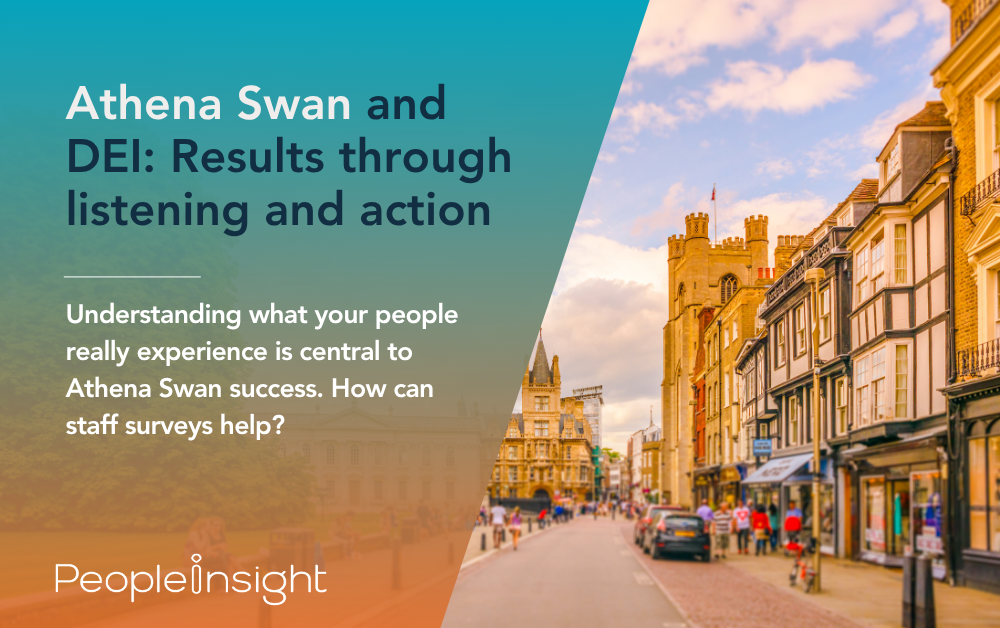
For institutions working towards or renewing Athena Swan accreditation, the pressure to demonstrate progress can sometimes obscure the original purpose of the Charter: to build fairer, more inclusive environments where all employees can succeed.
Policies alone won’t achieve that. Change happens when people are heard and when their experiences shape what comes next.
Employee listening plays a far greater role in Athena Swan than some realise. While data points are necessary, they’re not enough without the voices behind them. Lived experiences, when surfaced through honest feedback and thoughtful consultation, reveal the structural issues and day-to-day barriers that policies alone cannot fix.
Whether you’re leading a faculty submission or coordinating an institutional renewal, your strongest strategy is to ask, listen and act, using the insights gathered to inform decisions that genuinely improve inclusion and equality.
Related: The Race Equality Charter & employee voice: How to enact change
The Athena Swan Charter was launched in 2005 by the Equality Challenge Unit (now part of Advance HE) to support gender equality in higher education and research. Since then, its remit has expanded beyond women in STEMM to include all academic disciplines and professional staff. The Charter now addresses a broad range of equity issues, including intersectionality, caregiving responsibilities and flexible working.
Advance HE provides a detailed Athena Swan application framework that guides institutions through the submission and renewal process. Awards are given at Bronze, Silver and Gold levels depending on the evidence of commitment, progress and impact.
Importantly, the Charter is not a checklist. It requires a reflective, data-informed approach. Institutions must show they understand the barriers different groups face and that they are making progress in removing them.
Organisations across higher education are under growing pressure to demonstrate progress on equality, diversity and inclusion (DEI). For many, Athena Swan accreditation is part of this effort.
But achieving and maintaining this recognition is not just about ticking boxes. The institutions that make meaningful change know that listening to employees, and acting on what they hear, is what really sets successful Athena Swan submissions apart.
Athena Swan requires more than policy statements or committee minutes. It calls for evidence-based analysis, measurable action and a clear commitment to equity. And that can’t happen without knowing what employees actually experience in their departments, faculties and institutions.
To meet these standards, HEIs must build a genuine understanding of where inequalities exist. That starts with asking the right questions and listening carefully to the answers.
Related: How universities are tackling equal treatment for staff
The Athena Swan self-assessment process is grounded in data. Institutions are required to gather both quantitative and qualitative evidence across a range of themes, including recruitment, progression, pay, support for parents and carers, and intersectional inequalities.
The importance of self-assessment is not simply about compliance. It is about learning what is happening beneath the surface. For example, it is not enough to know that a department has an equal number of men and women in senior roles. You also need to know how they got there, and whether others have been excluded along the way.
This makes the role of employee sentiment particularly important. Combining data points with lived experiences allows institutions to move beyond surface-level analysis. It’s how they find actionable insights and develop DEI action plans with credibility.
The most successful institutions use employee survey platforms or 360 feedback tools that allow for data segmentation, qualitative comments and year-on-year comparison. This approach supports evidence-based decisions while showing employees their voices matter.
Advance HE has made it clear that Athena Swan is not a one-time exercise. Continuous progress is required, and as of the 2021 Charter guidance, consultation with staff and students is no longer just recommended, but expected.
This is where structured employee listening becomes your strongest strategy. Using DEI-focused higher education staff surveys helps uncover the day-to-day realities of different employee groups. Importantly, it provides a way to hear from those who might not feel comfortable speaking up in traditional settings.
A well-designed survey allows institutions to:
Used well, an actionable employee experience platform can help institutions move from anecdote to action, capturing the views of hundreds or thousands of people in a consistent, trackable way.
Getting the right data starts with asking the right questions. Diversity and inclusion surveys used for Athena Swan purposes should focus on themes that reveal how employees are experiencing inclusion, opportunity and support.
Some useful question areas include:
Including open-text questions is also useful, especially when exploring lived experiences. These free-text comments provide context, nuance and often spark deeper conversations in follow-up workshops or focus groups.
Survey results are only useful if they lead to action. One of the most common pitfalls in the Athena Swan process is gathering feedback without acting on it. Or worse, without communicating what’s been learned.
To avoid this, institutions should:
An actionable employee experience platform helps connect each of these steps. From capturing feedback to sharing insights, it supports institutions to build DEI strategies that are both evidence-based and human.
Athena Swan awards are not about perfection, but about progress. But progress is only possible when institutions are honest about their current culture and ready to listen with intent.
That listening must be ongoing, inclusive and supported by the right tools. Whether through DEI surveys, 360 feedback tools or higher education staff surveys, the goal is the same: to understand what employees are really experiencing and to act in ways that build trust and equity.
When institutions listen well, they ultimately create place where everyone feels valued and able to succeed.
Interested in using a DEI survey to support your Athena Swan application? Speak to us about our higher education staff surveys and how our actionable survey platform can support your next submission. Get in touch today.
